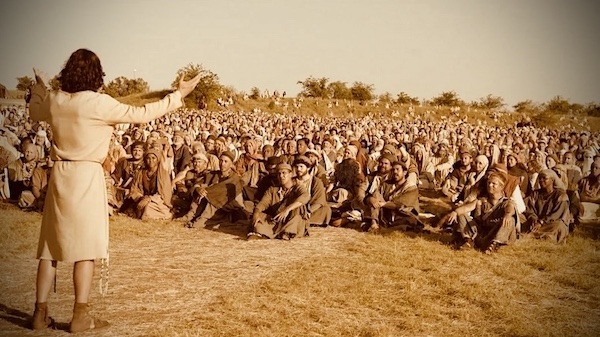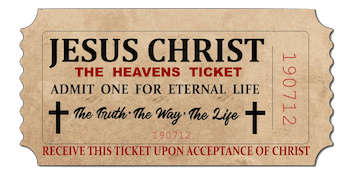Imagine yourself as a first-century resident of Capernaum. You have heard Jesus speak and seen him heal people, but you have also heard a lot of criticism. Some have accused him of being soft on the law, saying that Jesus is undermining the Torah and leading people astray.

So now, as you sit on the hillside with thousands of others, you listen carefully to what Jesus is telling the crowd:
Do not think that I have come to abolish the Law or the Prophets; I have not come to abolish them but to fulfill them. For truly I tell you, until heaven and earth disappear, not the smallest letter, not the least stroke of a pen, will by any means disappear from the Law until everything is accomplished. (Matthew 5:17–18)
. . . unless your righteousness surpasses that of the Pharisees and the teachers of the law, you will certainly not enter the kingdom of heaven. (5:20)
You have heard that it was said, “You shall not commit adultery.” But I tell you that anyone who looks at a woman lustfully has already committed adultery with her in his heart. If your right eye causes you to stumble, gouge it out and throw it away. (5:27–29)
Instead of loosening things up, Jesus seems to be tightening the screw. Rather than merely repeating the stricture against adultery, for instance, he tells you that a mere lustful glance makes one guilty of adultery. And then he links anger to the sin of murder. Ouch!
Modern Christians cherish the notion that Jesus came to free us from the unbearable burden of laws we cannot keep, but here Jesus seems to be saying the exact opposite!
So is the good news really as good as we think it is? Realizing that Jesus sets the bar higher and not lower is good news, once you understand what he was saying.
What more can I do to please my Father in heaven?
Ultimately, Jesus is not handing out a list of tougher rules and regulations, nor is he raising the bar to make life miserable. The intent of the Sermon on the Mount is not to make us run harder and jump higher, but to help us redirect our aim. Jesus is saying, “Don’t live by the minimum!”
Don’t say to yourself, as long as I don’t commit adultery, it’s fine to lust.
Don’t say that as long as I don’t kill anyone, I can be furious with them.
If you want to be part of God’s redemptive kingdom on earth, don’t ask how little you can do, but ask how much you can do to please your Father in heaven.
By changing our aim we are released from the burden of paying attention to infinitesimal rules designed to keep us out of trouble so that we can use our energy to love God more passionately.

This idea of “going beyond the minimum” is actually the predominant theme of the Sermon on the Mount. Over and over Jesus uses a formula to make his point: “You have heard that it was said . . . But I tell you . . .”
You have heard that you can take vows in God’s name, but I tell you to be a person with so much integrity that your yes and no are as good as an oath.
You have heard that you can punish people in the measure they have hurt you, but I tell you to turn the other cheek.
You have heard that you are to love your neighbor and hate your enemy, but I tell you to love your enemies.
Loan people your money, carry their burdens, go the extra mile.
Do everything you can to show that you are just like your Father in heaven.
No one can legislate what can be done purely out of love. So what did Jesus mean by exhorting his followers to display a “righteousness that surpasses that of the Pharisees and the teachers of the law” (Matthew 5:20)?
He may not have been speaking about outdoing particular individuals in their observance of the law, but about going beyond what the official interpreters of the law said you should do. The passage could then be read, “Do more than what the finest interpreters of the law say you must do.”
Hasidut – The Challenge to Go Beyond
This idea of “going beyond the minimum” was one for which the rabbis later formulated a name. They called it hasidut (ha-see-DOOT), which is often translated “piety.” It means to walk closely with God and to be utterly obedient to him. A hasid (ha-SEED), or pious person, eagerly asks the question, “What more can I do to please you?”
An Orthodox rabbi describes the idea of being a hasid as someone who
…does not do only what he is told, but looks for ways to fulfill G-d’s will. This requires intelligence and planning; one must anticipate just what G-d wants of him and how he can best use his talents and abilities in service of his Creator.
This rabbi is quick to distinguish real piety from “mock” piety, which involves showy displays of fasting or prayer. Real piety is
…careful, planned and responsible service of G-d. We are not to sacrifice ourselves for G-d with self-destructive acts of devotion; we are to live for Him.1
(Note that substituting the “o” in God with a hyphen is out of reverence for the name of God, to not use it in vain.)
A Revolution in Living out the Torah
The Sermon on the Mount was not a revolution against the Torah, but a revolution in understanding how to live out the Torah. Jesus was not exhorting you to become stricter than the strictest but to model your life on the character of God himself by living in a way that reflected his extravagant goodness.
 The Sermon on the Mount not only redirects our aim in life, it tells us something else—that we are not to live as though we have a ticket to heaven tucked snugly inside our pockets, as though we merely need to sit back and enjoy the ride. “Accepting Christ” is only the beginning, not the ultimate goal.
The Sermon on the Mount not only redirects our aim in life, it tells us something else—that we are not to live as though we have a ticket to heaven tucked snugly inside our pockets, as though we merely need to sit back and enjoy the ride. “Accepting Christ” is only the beginning, not the ultimate goal.
Likewise, evangelism is vital, but so is discipleship. To go no deeper is to risk being like the seed that fell not on good soil but on rocky ground, sprouting up but bearing little or no fruit. Focusing solely on God’s free gift of salvation is focusing on the minimum.
Saying yes to Christ is the first step of a great adventure with plenty of surprises and challenges along the way. Because of Christ’s enabling grace, we can make love the central aim and great fulfillment of our lives. Ultimately, God’s love is what frees us from rigidity and legalism. And God’s Spirit is what enables us to pattern our life on Christ’s.

~~~~~~
(This article is excerpted and condensed from the chapter called “Jesus and the Torah” in Sitting at the Feet of Rabbi Jesus, Spangler and Tverberg, (c) Zondervan, 2009.)

1 Rabbi Dovid Rosenfeld, “Chapter 2: Mishna 10–11c: G-d’s Immanent Presence,” available at this link.
If you are interested in learning what it means to “fulfill the Torah” in the first century, check out this three part series:
What “Fulfill the Law” Meant in its Jewish Context (1 of 3)
What Paul Says about Fulfilling the Law (2 of 3)
Is Christ the End of the Law? (3 of 3)
Or, you can just read all three essays together at this link:
What it means to “Fulfill the Law“
[Images: Angel Studios, Julius Drost, Tim Roosjen]
D.S. says
Thank you for this explanation. I’ve studied the Sermon on the Mount many times and this is one of the best descriptions of it I have ever seen or heard.
Bill Krohn says
Thank you for sharing this great article. Your writings and ministry have helped me much in my walk with our Lord.
God Bless!
Paula says
Thank you for your insights
jason says
Thanks for the thoughtful article!
PS. I take it you like the Chosen series? 🙂
Kirstin Wallace says
“ No one can legislate what can be done purely out of love.”
Read the whole article to my boys, and read this line twice. Always great work and scholarship!
bob bartels says
Thank you for adding freshness to what could become too liturgical or theological and thus dry.
John sulewski says
Lois,
Your not going to believe this but was reading one of you books yesterday on this exact
Same subject. God does work behind the scenes. Thank you for your email and I have defended you work to my small group class where several people have bought you books.
John
Fr Bob Swope DMin says
Drawn by G-d’s infinite indwelling love in the Messiah Jesus to do and be more than a minimal obedience peels back the layers of our inner psychospiritual resistence to surrendering all… an ongoing emptying of Self by grace alone. Thanks so much again Dr T for opening the Word for us!!
Bob Swope+ says
I have several of your books and cherish how you have made the depth of Hebrew meaning so clear and practical in our walk with the Lord. I have passed your scholarship on to several post-doc friends for their “aha!” enlightenment also. We are truly blessed with your teaching, Rabba.
Stevie K. says
Your article gives me more and more new insights into the sermon on the mount. Thank you so much for sharing your valuable thoughts with us.
Alfred says
I have to revisit your book and that chapter. Last read it last year around June. This expanded description is going to make my reading all worthwhile
Jacqueline Gunn says
Thank you for sharing this. This article gives such great insight into the “Sermon on the Mount”
and it clearly expresses the heart of Jesus in this discussion. Continued Blessings.
Torahwalk says
Isn’t the Sermon On Mount the reiterated “eternal covenant” that Yah has made with all His flock? Is YaHuWaH Dispensational? Did the believers in Yeshua stop sacrificing. Did they continue doing the Feast of Leviticus 23? And the Nazarite Vows? The Book of Acts and the Epistles are evidence they continued keeping all the torah-instructions and Feast. Unfortunately, happy pagans have twisted the Scriptures and lead billions astray. Unless our “straightwalking” is like Abraham’s we will “miss the mark.”
Gen 26:5 TS2009 “because Aḇraham obeyed My voice and guarded My Charge: My commands, My laws, and My Torot.” 1Jn 2:5 TS2009 “But whoever guards His Word, truly the love of Elohim has been perfected in him. By this we know that we are in Him.” 🙌With a slaughtered, broken, contrite heart, wanting to hear and obey we will be taw-meen perfect, without blemish, spot, wrinkle, or sin. Born-again isn’t new, it’s Re-Newed. Ps. 32 & 51 We are truly Israel. 1Pe 2:9 TS2009 But you are a chosen race, Deu. 10:15 a royal priesthood, Isa. 61:6 a set-apart nation, Exo. 19:6 a people for a possession, Isa. 43:2 that you should proclaim the praises of Him who called you out of darkness into His marvellous light,